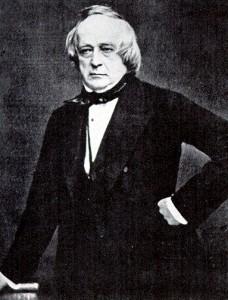February 4, 1861 was an important day. As Civil War Daily Gazette reports, the peace convention convened in Washington, D.C. while the confederacy convention of seceding states had its first meeting in Montgomery, Alabama. Also, the two U.S. senators from seceded Louisiana, Judah Benjamin and John Slidell, took leave of their fellow senators. Here’s some excerpts from Slidell’s parting words.
From The New-York Times February 5, 1861:
Mr. SLIDELL — Mr. President: The document which the Secretary has just read, and which places on the files of the Senate official information that Louisiana has ceased to be a component part of these once United States, terminates the connection of my colleague and myself with this body. The occasion, however, justifies, if it does not call for, some parting words to those whom we leave behind — some, forever — others, we trust, to meet again, to participate with them in the noble work of constructing and defending a new Confederacy …
We must be prepared to resist coercion, whether attempted by avowed enemies, or by a hand heretofore supposed friendly, — by open war or under the more insidious, and, therefore, the more dangerous pretext of enforcing the laws, protecting public property, or collecting the revenue. We shall not cavil about words or discuss legal and technical distinctions. We shall consider the one as equivalent to the other, and shall be prepared to act accordingly, — utroque arbitro parati, you will find us ready to meet you with the outstretched hand of fellowship, or in the mailed panoply of war, as you may will it. Elect between these alternatives. …
We have no idea that you will ever attempt to invade our soil with your armies. But we acknowledge your superiority on the sea at present, in some degree accidental, but in the main natural and permanent, until we shall have acquired better ports for our marine. You may, if you so will it, persist in considering us bound to you during your good pleasure. You may deny the sacred and indefeasible right, we will not say of secession, but of revolution, aye, of rebellion, if you choose thus to style our action — the right of every people to establish for itself that form of government which it may, even in its folly, if such you deem it, consider best calculated to secure its safety and promote its welfare. You may ignore the principles of our immortal Declaration of Independence. You may attempt to reduce us to subjection, or you may, under color of enforcing your laws or collecting your revenue, blockade our ports. This will be war, and we shall meet it with different but equally deficient[sic?] weapons. We will not permit the consumption or introduction of any of your manufactures. Every sea will swarm with our volunteer militia of the ocean, with the striped bunting floating over their heads, for we do not mean to give up that flag without a bloody struggle. It is ours as much as yours, and although for a time more stars may shine on your banner our children, if not we, will rally under a constellation more numerous and more resplendent than yours. You may smile at this, as an important boast, at least for the present, if not for the future. …
But enough, perhaps somewhat too much, of this. We desire not to speak to you in terms of bravado or menace. Let us treat each other as men who are determined to break off unpleasant, incompatible and unprofitable relations. Cease to bandy words, and mutually leave each other to determine whether their differences shall be decided by blows, or by the code which some of us still recognize as that of honor. We shall do with you as the French Guards did with the English at the battle of Fontenoy. In a preliminary skirmish the French and English guards met face to face. The English Guards courteously saluted their adversaries by taking off their hats. The French returned the salute with equal courtesy. Lord HAY, of the English Guard, cried out in a loud voice, “Gentlemen of the French Guard, fire!” Count D. ACTEROCHE replied in the same tone, “Gentlemen, we never fire first.” The English took them at their word, and did fire first. Being at close quarters, the effect was very destructive, and the French for a time were thrown into some disorder, but the fortunes of the day were soon restored by the skill and courage of Marshal SAXE, and the English, under the Duke of Cumberland, suffered one of the most disastrous defeats which their military annals record. Gentlemen, we will not fire first. …
We have often seen it charged that the present movement of the Southern States is merely the consummation of a fixed purpose long entertained by a few intriguers for the selfish object of personal aggrandisement. There never was a greater error. If we were not about to part, we should say a grosser or more atrocious calumny. Do not deceive yourselves. This is not the work of political managers, but of the people. As a general rule, the instincts of the masses, and the sagacity of those who in private life had larger opportunities for observation and reflection, had satisfied them of the necessity of separation long before their accustomed party leaders were prepared to propose it. We appeal to every Southern Senator yet remaining here whether such be not the case in his own State. Of its truth I can give no stronger illustration than the vote in the Louisiana Convention of 130 members, every delegate being in his seat, voted for immediate secession; and of the seventeen who voted against it, there were not more than four or five who did not admit the necessity of separation, and only differed as to the time and mode of its accomplishment. Nor is the mere election, by the forms of the Constitution, of a President distasteful to us the cause, as is so often and so confidently asserted, of our action. It is this: We all consider the election of Mr. LINCOLN, with his well-known antecedents and avowed principles and purposes, by a decided majority over all other candidates combined in every Free State on this side of the Pacific slope — noble gallant New-Jersey excepted — was conclusive evidence of the determined hostility of the Northern masses to our institutions. We believe that he conscientiously entertains the opinions which he has so often and so explicitly declared, and that having been elected on the issues thus presented, he will honestly endeavor to carry them into execution. While now we have no fears of servile insurrection, even of a partial character, we know that his inauguration as President of the United States would have been considered by many of our slaves as the day of their emancipation, and that the 4th of March would have witnessed in various quarters outbreaks which, although they would have been promptly suppressed, would have carried ruin and devastation to many a Southern home, and have cost the lives of hundreds of the misguided victims of Northern negrophilism. …
More of Slidell’s and Benjamin’s February 4th speeches are at The New York Times Archive
You can read more about John Slidell and Maurice de Saxe at Wikipedia.


